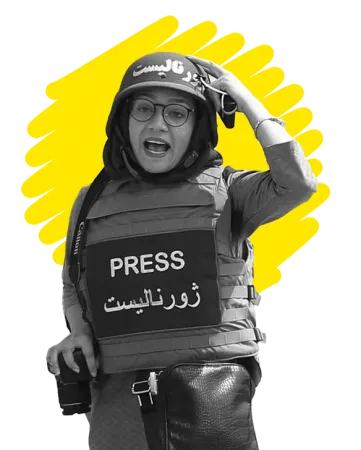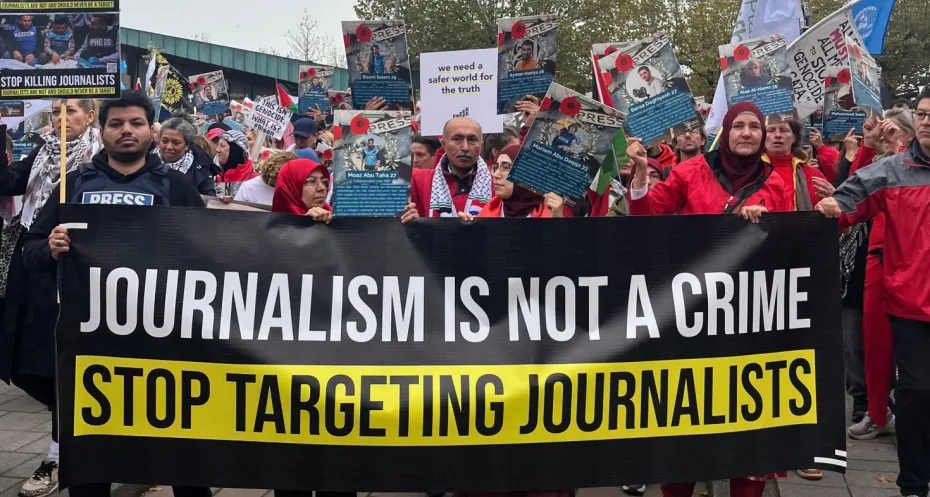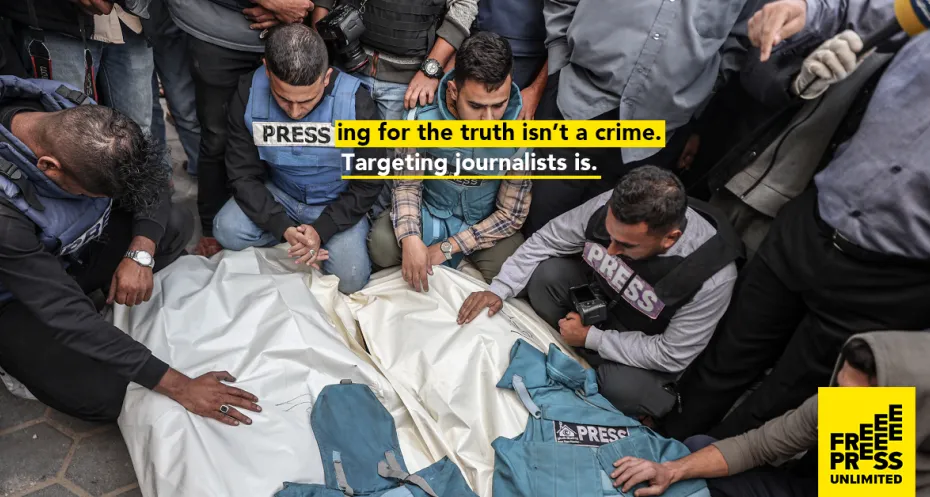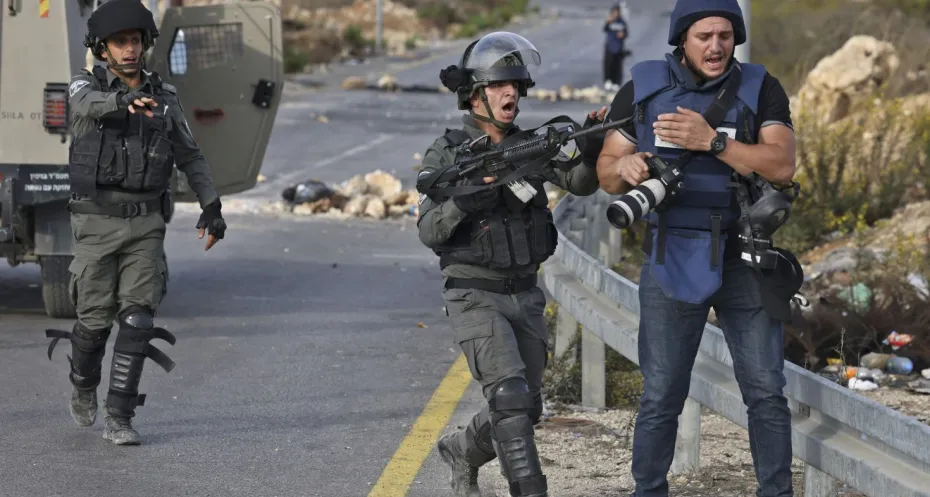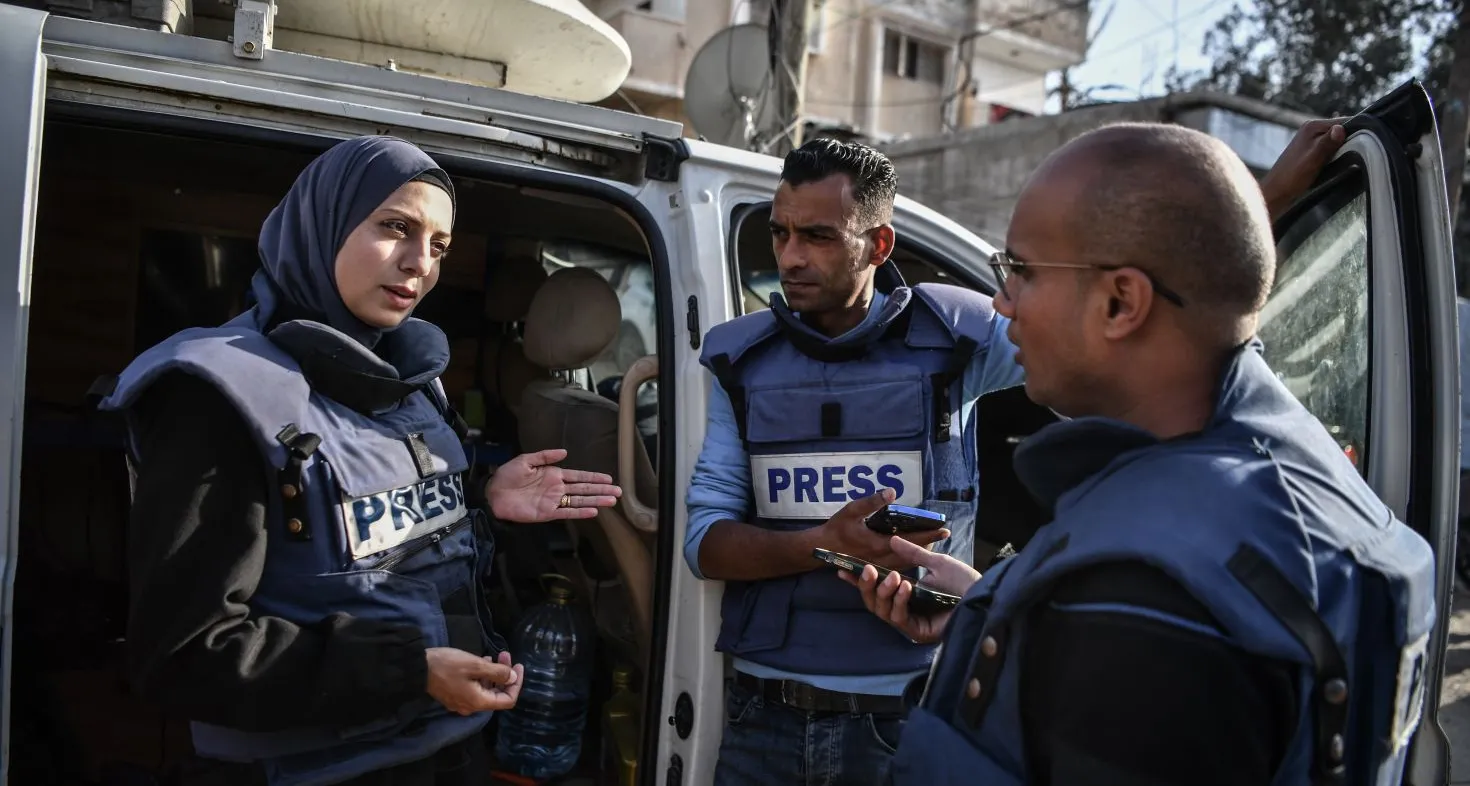
The impact of Israel’s war in Gaza on media in the region
The impact of the events in Gaza and the West Bank reach far beyond their borders. The gathering of, and access to reliable information plays a crucial part in this. To get insight into how the situation in Israel and Palestine impacts media in neighbouring countries, we spoke with two of our partners in the region.
That media and journalists operating in the countries surrounding Israel and Palestine have been directly impacted by the events there is not something new. For example, in May 2022, the noted Palestinian journalist Shireen Abu Akleh was killed by the Israeli forces while reporting from the West Bank. Journalists from Lebanon, Egypt, or Jordan, who report on the conflict and the resulting refugee crisis, or from border areas, are in direct danger. The number of journalists killed in Gaza continues to rise, with the latest reports putting the deaths at 95 journalists since 7 October.
For journalists outside of Gaza the situation also worsened, with three Lebanese journalists killed by Israeli strikes in the South of Lebanon. In neighbouring Jordan, media and journalists report not only on the worsening situation in Gaza but also on the protests among the Jordanian public – which have even resulted in the Jordan government halting negotiations with Israel regarding water and energy agreements.
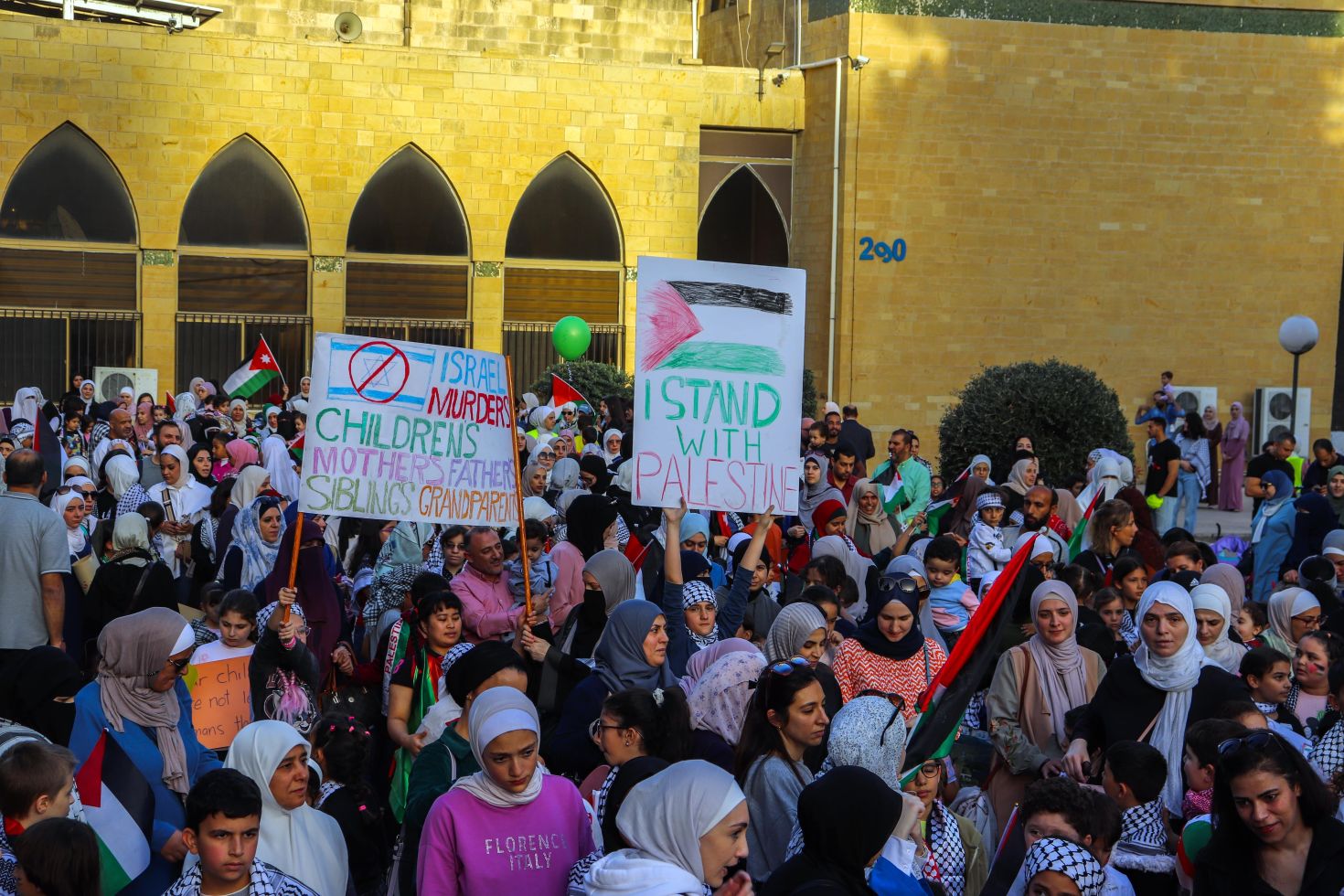
To understand the impact on journalism, we spoke to Isam Uraiqat from regional media outlet Al Hudood, and Layal Bahnam from the Maharat Foundation in Lebanon. Al Hudood uses satire to comment on current events. In regard to Gaza, they used this method to educate readers about the danger of accepting the status quo and normalising the occupation. The Maharat foundation is a women led organisation working to advance the development of democratic societies by defending and advocating for freedom of expression and respect for human rights, including media freedom.
Impact on content
Al Hudood has created content that challenges Israeli reporting blaming Palestinians exclusively for what is happening, and clarified the underlying causes and roots of the conflict. As a critical voice, they strive to shine a light on narratives in the media. Isam: “We also educate the reader about attempts by some Palestinian politicians to exploit the situation for their benefit and political goals by exposing their populist speeches and statements. We had to be extremely cautious at this point to avoid being misunderstood as inciting against Palestinians.”
“In the first months after 7 October we saw the dominance of the narrative that supported Israel unconditionally."
Layal Bahnam has also witnessed a push for certain narratives in the media. “In the first months after 7 October we saw the dominance of the narrative that supported Israel unconditionally. When we analysed how the media covered the war in Ukraine and how it covered the war in Gaza, we witnessed double standards. We see how in one case the glorification of a war is accepted, and in another it is condemned.”
Providing reliable information on this, and any conflict, is very important. Mis- and disinformation can be very harmful. Research on news consumption in Lebanon confirms this, revealing certain vulnerabilities that contribute to the spread of false narratives. These include limited awareness of how to verify claims and where to access fact-checked content, and a tendency to dismiss information that goes against existing beliefs.
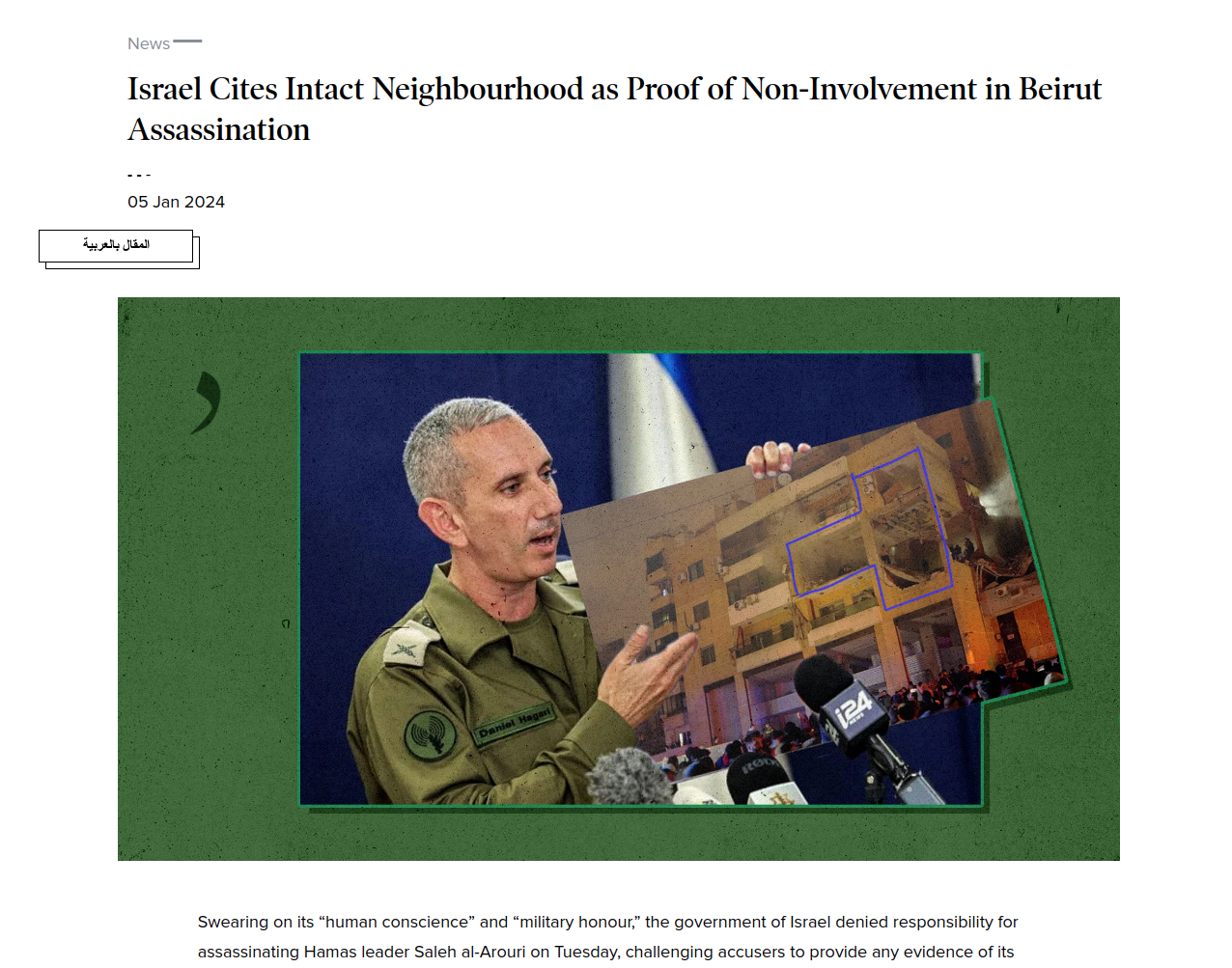
Safety of journalists
Isam has seen existing issues for media in MENA-countries deepen because of the conflict. He says: “In Jordan for example, the “official” media promotes state propaganda, completely ignoring the critique people have on the war in Gaza, but they are highlighting the damage caused by boycotts. The independent media that does try to report objectively continues to face repression and harassment, including arrests. Or they are summoned to intelligence agencies where they are threatened to keep them from publishing.”
Layal: “The number of journalists killed in Gaza keeps increasing everyday. Maharat has been advocating since its establishment to end impunity for crimes against journalists. Even though the past few months have been the deadliest for journalists ever documented, we see no serious attempt from the international community to implement treaties, resolutions, and commitments that protect journalists, while also holding Israel accountable. This definitely impacts journalism in the region, as the current impunity causes the legitimisation of killings of journalists.”
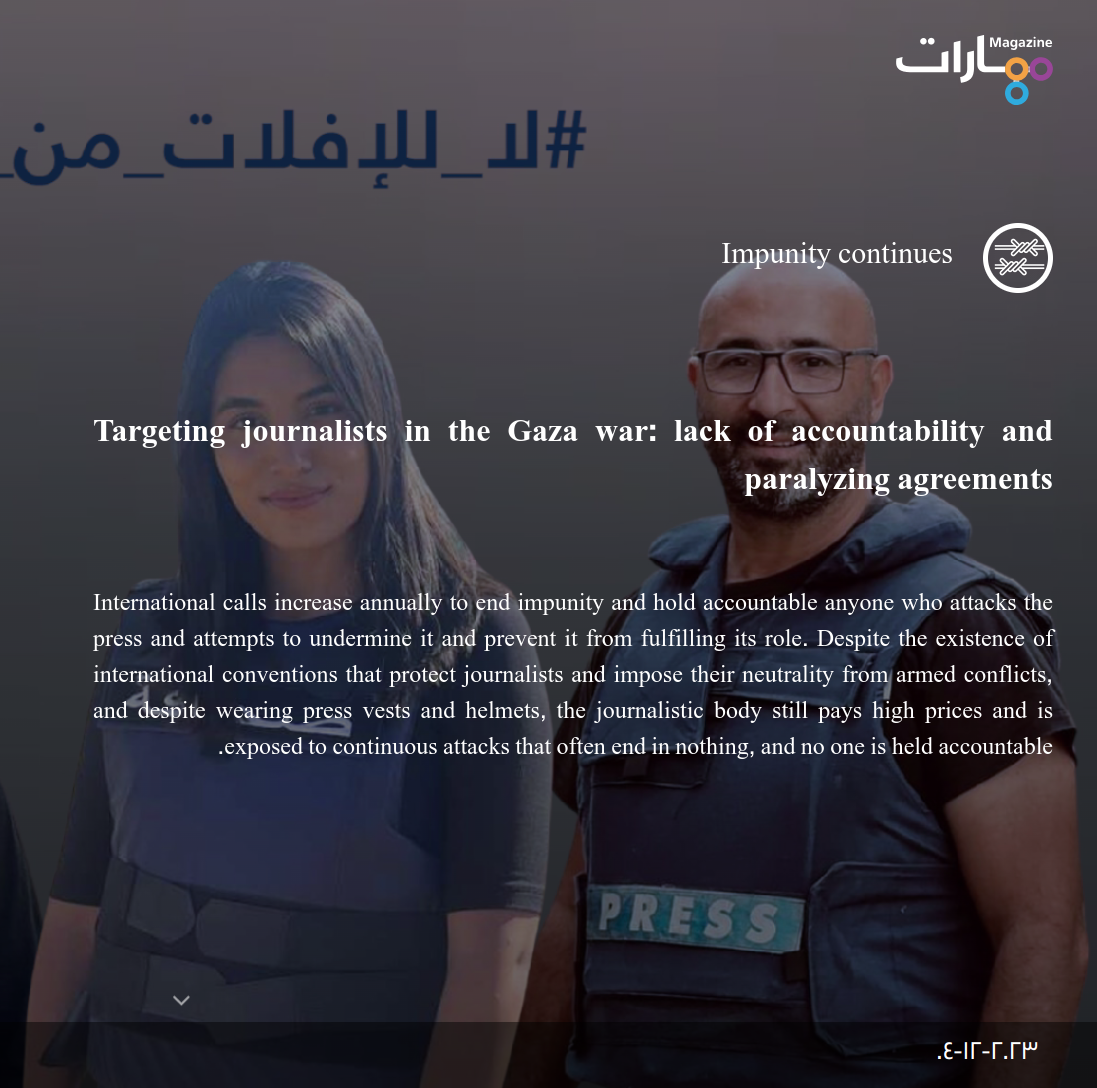
Way of working
Since the situation in especially Gaza is so dire, with its population living in fear of regular bombings and lacking the most basic needs, it is very difficult to report on the ground, and to get in touch with sources. Al Hudood does have a network of contacts on the ground who feed them with information on the current events. “We hear from them what is not reflected in the main stream media, such as living conditions, the daily fear and terror, and the hope for an end to the war,” Isam says.
"A Palestinian fact-checker reported to us how the war impacts the mental health of journalists.“
But since the circumstances are so challenging and a lot of mis- and disinformation is circulating in the media and online, it is very important to remain focused on fact-checking and evidence based reporting. Al Hudood has one person who completely focuses on fact-checking through research and source comparison.
As for Maharat, Layal says: “We are not able to communicate with journalists in Gaza, but we are in touch with journalists in the West Bank. They are facing challenges as well, like threats and self-censorship. A Palestinian fact-checker we are in touch with reported to us how the war impacts the mental health of journalists who see all the violence and atrocities in the videos they watch in their fact-checking work.“
Free Press Unlimited is constantly looking for ways to support media workers on the ground. Read more about our crisis response here.
Keep documenting
Six months into the increase of violence in Palestine, there is the real risk that international attention will decrease as time passes as we have also seen happening with Ukraine. Both Layal and Isam stress the importance of continuing reporting on the events in Palestine, especially from across the border.
Isam: “We need to keep publishing to challenge the trend of normalisation of the abandonment of Palestinian people's rights. What is happening there provides undeniable evidence of the brutality of the occupation and its lack of any intention for peace with the region as a whole, not just the Palestinians. Continuing to focus on the war crimes committed will protect the new generation, especially from the influence of propaganda advocating normalisation of these crimes.”
Media in the neighbouring countries, with their networks of journalists, freelancers and fact-checkers, are a vital link in ensuring any information on the situation in Gaza continues to be shared.
Layal: “The media should keep reporting on Gaza, which is becoming more and more difficult with the inability of journalists to work from inside Gaza. The daily targeting of civilians, including journalists, and the absence of infrastructure like access to internet, are obstructing journalists from gathering and disseminating information. Journalists should be enabled to keep telling their stories. We do fortunately see a counter movement existing to the Israeli narrative on social media, despite the algorithms censoring the Palestinian narrative.”
Media in the neighbouring countries, with their networks of journalists, freelancers and fact-checkers, are a vital link in ensuring any information on the situation in Gaza continues to be shared. Free Press Unlimited, supporting our partners in the region, seeks to enable independent and sensitive reporting on the conflict. We further call for the protection of journalists while they do this vital work, in Gaza, Lebanon and all countries where the impact of this conflict is felt.
